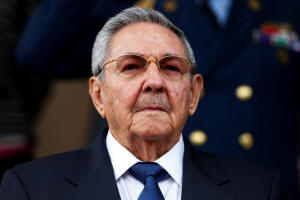Castro era in Cuba to end as Raul confirms he's retiring
 Send a link to a friend
Send a link to a friend
 [April 17, 2021]
By Sarah Marsh and Nelson Acosta [April 17, 2021]
By Sarah Marsh and Nelson Acosta
HAVANA (Reuters) - Raul Castro confirmed he
was handing over the leadership of the Cuban Communist Party to a
younger generation at its congress that kicked off on Friday, ending six
decades of rule by himself and older brother Fidel.
In a speech opening the four-day event, Castro, 89, said the new
leadership would be party loyalists with decades of experience working
their way up the ranks and were "full of passion and anti-imperialist
spirit."
Castro had said at the previous party congress in 2016 it would be the
last one led by the "historic generation" who fought in the Sierra
Maestra to topple a U.S.-backed dictator in the 1959 leftist revolution.
He already handed over the presidency in 2018 to protege Miguel Diaz-Canel,
60, who ran the party in two provinces before joining the national
government.
The new generation of leaders, which did not forge itself through
rebellion, has no easy task. The transition comes as Cuba faces the
worst economic crisis since the collapse of former benefactor the Soviet
Union, while there are signs of growing frustration, especially among
younger Cubans.

"I believe fervently in the strength and exemplary nature and
comprehension of my compatriots, and as long as I live I will be ready
with my foot in the stirrups to defend the fatherland, the revolution
and socialism," Castro told hundreds of party delegates gathered at a
convention center in Havana.
The congress, the party's most important meeting, held every five years
to review policy and fix leadership, is a closed-door event but excerpts
are being broadcast on state television.
Castro himself became acting president when Fidel fell ill in 2006 and
later in 2011 party leader, launching a raft of social and economic
reforms to open up one of the world's last Communist-run countries that
later stalled.
On Friday, he hailed Diaz-Canel as one of the new generation of leaders
that was picking up where he left off.
Castro's olive green military fatigues contrasted with the civil get-up
of his protege, who is widely expected to succeed him as party first
secretary, the most powerful position in Cuba's one-party system.
Older Cubans said they would miss having a Castro at the helm, although
most acknowledged it was time to pass on the baton.
"It's another stage," said Maria del Carmen Jimenez, a 72-year old
retired nurse, "but without a double we will miss him."
Castro denounced renewed U.S. hostility under former President Donald
Trump. Incumbent President Joe Biden has vowed to roll back some of
Trump's sanctions, although the White House said on Friday a shift in
Cuba policy was not among his top foreign policy priorities.

Castro said Cuba was ready for a "new type of relationship with the
United States without ... Cuba having to renounce the principles of the
revolution and socialism."
[to top of second column]
|

Cuba's President Raul Castro attends to an ALBA alliance summit in
Caracas March 17, 2015. REUTERS/Carlos Garcia Rawlins/File Photo

PRESSURE TO REFORM
Cuba's new leaders face pressure to speed up reform, particularly
economic change, which is foremost on citizens' minds, especially
younger Cubans who have known only crisis, analysts say.
A tightening of the decades-old U.S. trade embargo and the
coronavirus pandemic have exacerbated a liquidity crisis in Cuba's
ailing centrally planned economy. Shortages of even basic goods mean
Cubans spend hours lining up to buy groceries.
And Havana has dollarized parts of the economy, leaving those who do
not receive remittances from family abroad or did not earn hard
currency from tourism struggling to get by. That has eaten away at
equality, a pillar of the party's legitimacy.
Since the expansion of internet access in recent years, Cubans are
increasingly using social media as a platform to express criticism,
while online non-state media are challenging the state monopoly of
mass media.
Tight control of public spaces by the authorities means protests are
still relatively rare and small-scale, but they are on the increase
nationwide on issues as varied as excessive red tape to curbs on
civil liberties.
Castro said on Friday it was important to pursue reform with greater
"dynamism", denouncing - as he has in the past - "inertia,
conformism, the lack of initiative" in state companies. The
government has resumed a set of economic reforms the party agreed on
at its 2011 congress in recent months, in particular eradicating
Cuba's dual currency, multiple exchange rate system in January.
Yet Castro said reforms fomenting the non-state sector should not go
beyond certain limits that would lead to the "very destruction of
socialism and the end of national sovereignty."

Party militants like Rogelio Machado, a mathematics teacher, say
they were confident the new generation was up to walking that
tightrope.
"Our country need changes and the new generation is more
scientifically prepared to continue the path of socialism," he said.
But government critics like "artivist" Luis Manuel Otero Alcantara,
whom Havana accuses of being part of a U.S.-backed soft coup
attempt, say the death knell is sounding for the revolution.
"Raul is passing over the power to someone with little charisma and
who does not have much popular support," he said while staging his
latest performance against the government, in which he sits in a
garrote for the four days of the congress. "This takes us one step
closer to democracy."
(Reporting by Sarah Marsh and Nelson Acosta in Havana; Additional
Reporting by Marc Frank and Reuters TV; Editing by Daniel Flynn,
Rosalba O'Brien and Daniel Wallis)
[© 2021 Thomson Reuters. All rights
reserved.] Copyright 2021 Reuters. All rights reserved. This material may not be published,
broadcast, rewritten or redistributed.
Thompson Reuters is solely responsible for this content. |